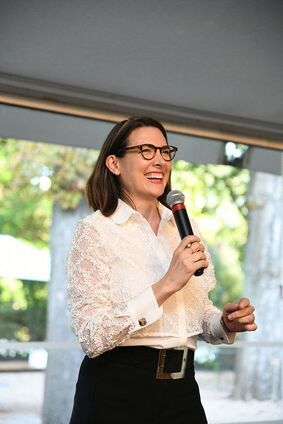
Audrey Chapuis is a nonprofit executive specializing in strategic development and organizational growth. As the current Executive Director of the American Library in Paris, she has managed significant initiatives such as the library's centennial capital campaign and has been instrumental in expanding its cultural programs and international partnerships.
She holds a Master's degree in Library and Information Science from the University of Illinois and an Executive MBA from HEC Paris, with a focus on digital transformation. An advocate for digital literacy and open access in scholarly publishing, Audrey often addresses these topics in her professional speaking engagements.
In addition to her role at the American Library in Paris, Audrey serves on the Board of Marymount International School. Her board activities draw upon her expertise in education, libraries, and nonprofit organizations.
Audrey is also a regular guest speaker at universities and conferences, discussing organizational development, social impact philanthropy, and community building through cultural institutions.
Outside of her professional roles, Audrey has a keen interest in visual arts and enjoys sketching to conceptualize complex ideas in a simplified form.
She holds a Master's degree in Library and Information Science from the University of Illinois and an Executive MBA from HEC Paris, with a focus on digital transformation. An advocate for digital literacy and open access in scholarly publishing, Audrey often addresses these topics in her professional speaking engagements.
In addition to her role at the American Library in Paris, Audrey serves on the Board of Marymount International School. Her board activities draw upon her expertise in education, libraries, and nonprofit organizations.
Audrey is also a regular guest speaker at universities and conferences, discussing organizational development, social impact philanthropy, and community building through cultural institutions.
Outside of her professional roles, Audrey has a keen interest in visual arts and enjoys sketching to conceptualize complex ideas in a simplified form.
|
Photograph by Krystal Kenney.
|
|